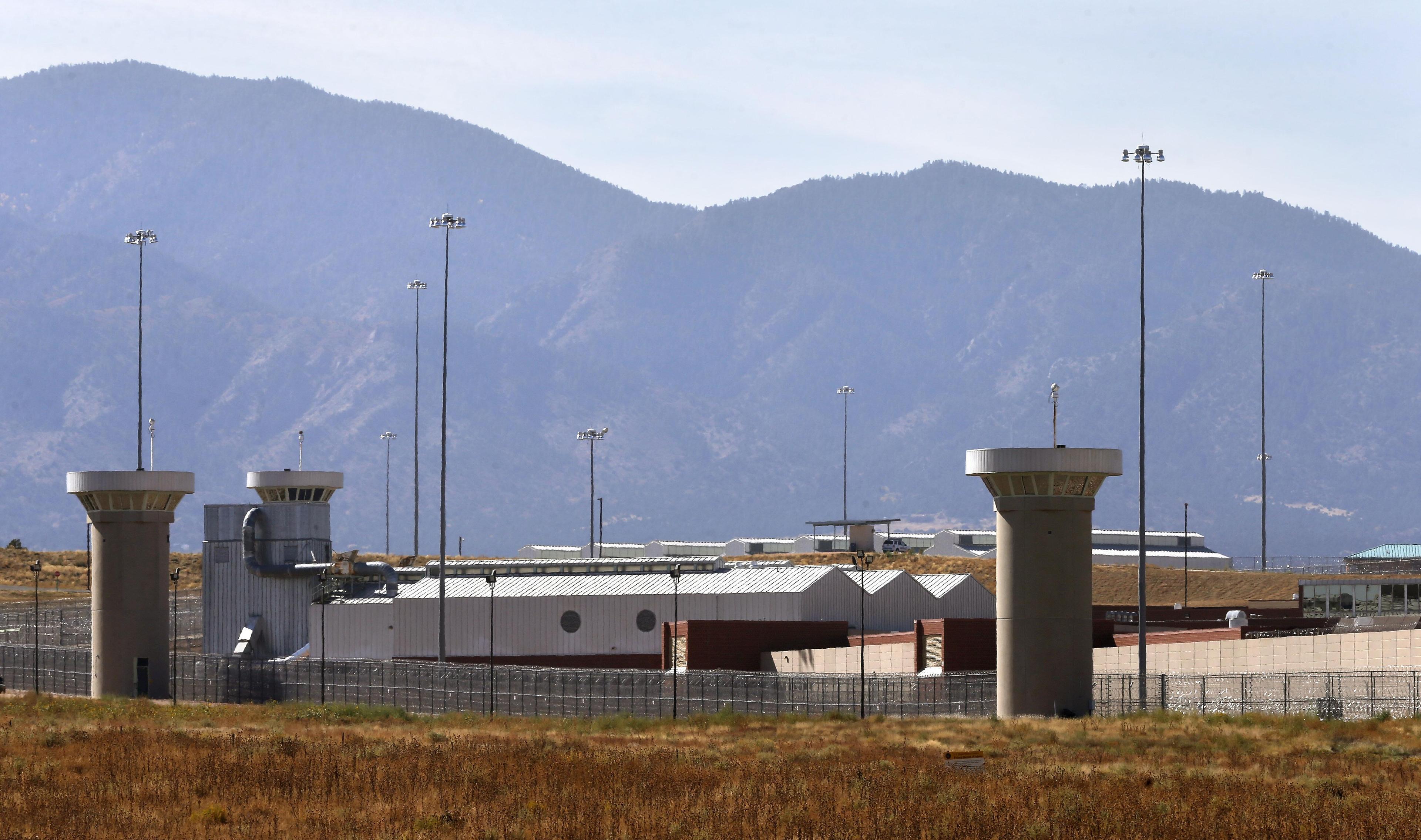
 More protesters gathered outside ink! Coffee in northeast Denver Tuesday morning. The shop sparked outrage within the community last week because of a sign it placed out front that said: "Happily gentrifying the neighborhood since 2014."
More protesters gathered outside ink! Coffee in northeast Denver Tuesday morning. The shop sparked outrage within the community last week because of a sign it placed out front that said: "Happily gentrifying the neighborhood since 2014."
City Council President Albus Brooks, who represents the district, tells Colorado Matters "you couldn't have a more incredibly divisive sign at this time."
But he's been in hot water himself. During demonstrations last Saturday, people carried posters that said: "Albus Brooks. Happily gentrifying the neighborhood since 2011. #ResistBrooks2019."
Protest organizers such as Lisa Calderón, co-chairwoman of the Colorado Latino Forum, and 19-year-old Tay Anderson, who ran for the Denver School Board, have said this is about something much bigger than a sign. It's about the displacement of people who have lived in this community for years and are now being pushed out. Addressing a crowd of protestors last Saturday, Calderón said "our political leaders have failed us." They say Brooks is part of the problem.
Ink! Coffee founder Keith Herbert issued an apology on Facebook: "I am embarrassed to say that I did not fully appreciate the very real and troubling issue of gentrification, and I want to sincerely apologize to those who understand firsthand the hardship and cultural consequences that gentrification has caused in the Five Points neighborhood, throughout the City and County of Denver and in communities throughout our state."
The issue of displacement remains a pressing one in many parts of Denver. So what's next? Brooks says he wants Herbert to educate his employees in "cultural competency."
Interview Highlights
On gentrification in his district:
"When we talk about gentrification, it's income inequality... I think it's very complicated. It's going to take the private sector, the community and our local government working together with our state government, because there's a lot of state policies that we need to start looking at -- and federal policies as will. I think I'd start with... micro economics, supporting local businesses. It's also about housing. We instituted the largest housing fund in Colorado's history in 2016. And we need to do more."
On specific next steps:
"I understand the [ink! Coffee] apology and I appreciate [Herbert] taking that step. However, this is such a deep-rooted issue. I believe it calls for reconciliation, which I've been attacked for [saying]. And reconciliation to me is restoring defrauded parties. So it's really deeply understanding this issue, having someone from the community take them through cultural competency understanding and training, making sure [Herbert] is specifically hiring folks of color from the neighborhood. I think also trying to invest in social programs within northeast Denver. I tell that to every business that comes into northeast Denver... you have to be a part of the social fabric and understand the history of the community."
Transcript
Ryan Warner: Councilman, welcome back to the program. Councilman Albus Brooks: Thanks for having me. RW: You were actually singled out during the weekend protests. The demonstrators held posters that said "Albus Brooks happily gentrifying the neighborhood since 2011." What message do you take from that? AB: You know, first of all, you couldn't have a more incredibly divisive sign at this time, and I think this speaks to it's a sign of a deeper reality that's happening in our community, that's been happening for the last 20 years, of gentrification. And I think our community is looking for answers, and they're starting with their politicians. So, I understand the frustration. Obviously, gentrification and economics are much complicated than one person or a local government, and so I think it was misguided, but I understand the frustration. RW: They are looking to their elected officials for answers, and what answers do you have for them? AB: I think that, first of all, when we talk about gentrification, it's a 20 and 30 year process. It's income inequality. 80205 was the highest gentrified zip code in 2010, according to Atlantic City's magazine. RW: In Colorado, that is. AB: I think it's very complicated, and what I say is it's going to take the private sector, it's going to take the community, and it's going to take our local government working together with our state government, because there's a lot of state policies that we need to start looking at, and federal policies as well. So it's not just one answer to this. RW: Where would you start? AB: I think I'd start, which what we've already been doing, is microeconomics. Begin supporting local businesses in the community. Obviously we have done that on the economic side, but we also have, it's about housing. We instituted the largest housing fund in Colorado's history in 2016, and we need to do more. I've been on record saying we need to put $100 million more into this housing fund, and so it's going to take all of those stools to, legs on the stool, to begin to change what's going on in gentrification. But it's tough. It's a tough issue. RW: Interesting. You talk about local business. Ink is a Colorado based business. AB: Mm-hmm. And when I say local, I mean northeast Denver. Not a chain. We know a lot of these coffee shops that are not a part of a chain who don't have the capital to get espresso machines. I mean, simple things like that. So I think it's important that we support those businesses. Not that we don't support other businesses that have chains, but it's important for us to preserve the character of the neighborhood, that we support those folks who are from the neighborhood as well. RW: If they can afford to stay there. I'll ask you more about displacement, which is really- AB: Yes, yes. RW: I think the- AB: That's the crux of the gentrification. Displacement. RW: I just want to note that ink!'s founder, Keith Herbert, apologized. He first responded on Twitter acknowledging the ad was in poor taste, then followed up saying he needs to "Better educate myself on gentrification. I am embarrassed to say that I did not fully appreciate the very real and troubling issue of gentrification, and I want to sincerely apologize." Albus Brooks, I understand that he also emailed you directly, and you are asking him, again, the owner of Ink Coffee, for some very specific things. Like what? AB: Yeah. So first of all, I understand the apology and I appreciate him taking that step. However, this is such a deep rooted issue. I believe it calls for reconciliation, which I've been attacked for. But I think reconciliation needs to happen, and reconciliation to me is restoring defrauded parties. So it's really deeply understanding this issue. Having someone from the community take him through cultural competency understanding and training. Making sure he is specifically hiring folks of color from the neighborhood. 80205 has the highest ex-offender re-entry population in the city. I think, and also, trying to invest in social programs within northeast Denver, and some of our elementary schools. And so I tell that to every business that comes into northeast Denver is you can no longer be a business operating on your own. You have to be a part of the social fabric. You have to understand the history of the community. And while all of our energy is focused on Ink, by the way, side note, a 13 year old boy shot two other kids in Manual High School parking lot indeed, on Thanksgiving. And no one's talking about that. So this is kind of my point. All of our energy is focused here and we're not seeing the community at large. So, they shut down. "Yay, we win." But, do we win? You know? Have we invested in our local, you know, coffee shops here? Have we helped someone learn what went wrong in the first place? Or, have we just returned hate with hate? You know, and so I struggle with that. And I want to do something where we can grow from. I want to seize this opportunity for our entire community. RW: Lisa Calderon of the Colorado Latino Forum helped organize the protests. She said, "This is not about a sign. It is about people being pushed out of a community they lived in for years." And, she has placed blame on city leaders. "Our political leaders have failed us and left us behind." So, let's wrap up on this idea of displacement. What exists for someone right now, today, if they are getting pushed out of Denver because it's too expensive? AB: Yeah. So, I want to be very clear on displacement. Displacement is not in the home ownership category. It's in the rental category and someone cannot afford what their landowner is jacking up the price with, right? And so, that is something that we are working very hard on. Matter of fact, you know, our city council is working on a fund, a legal fund to help folks who have been evicted and displaced, and that's a real issue. But again, we as government cannot solve that in its own. This has to be a community conversation. We need to know the individuals who are in these situations. We need to all be working together to find that. But I share Lisa's and I share everyone's concern with displacement and figuring out how we address that issue. The other issue is, these, you know, these affordable housing units that have been deed restricted for 20 years, are now coming off that deed restriction and going onto the market and will be sold. And, what the city has done has moved into this first right of refusal. So, every deed restricted property that is now coming off the market, the city can purchase. And so that's one way that I think we're fighting that displacement issue in my district in a very real fashion. RW: One last thing. Organizers from the protests said they would form a new coalition to fight gentrification. Their goals include supporting future city council and mayoral candidates who will, "Put a curb on gentrification." They've also called on the mayor and the council to get rid of the so called urban camping ban that was legislation youth sponsored, and to ditch the I-70 project, a plan you've endorsed. How do you see those issues, if at all, relating to this conversation? AB: Yeah, I think now what you're saying is there are a lot of issues all over the city and folks are beginning to pile on in front of this ink!! Coffee deal. Which was unfortunate, because I think, you know, the owner and ink!! need to be held responsible for, and, why they put this out, and their thinking, and all that kind of stuff. But now we see all the other issues in the city kind of caked up upon that which I see is unfortunate. One, I think no one counts a person, no one mayor can curb gentrification. It takes an entire community. I think, two, I-70 is a fifteen year project, a state issued project, a federal project that is more complex than one individual. And so I mean these are, I think these are folks who are frustrated with some things in the City and unfortunately they're using this as a platform to talk about it. RW: Councilman, thanks for your time. AB: Thank you. |
Related:
A Denver Community Considers A Land Trust To Keep Residents In Their Homes
Discriminatory Lending That Once Stifled Denver Neighborhoods Now Fuels Gentrification
As East Colfax Redevelops, Affordability Goals And Gentrification Are Neck And Neck
Denver Tries To Minimize Gentrification's Pain Points In 'Dynamic' Neighborhoods









